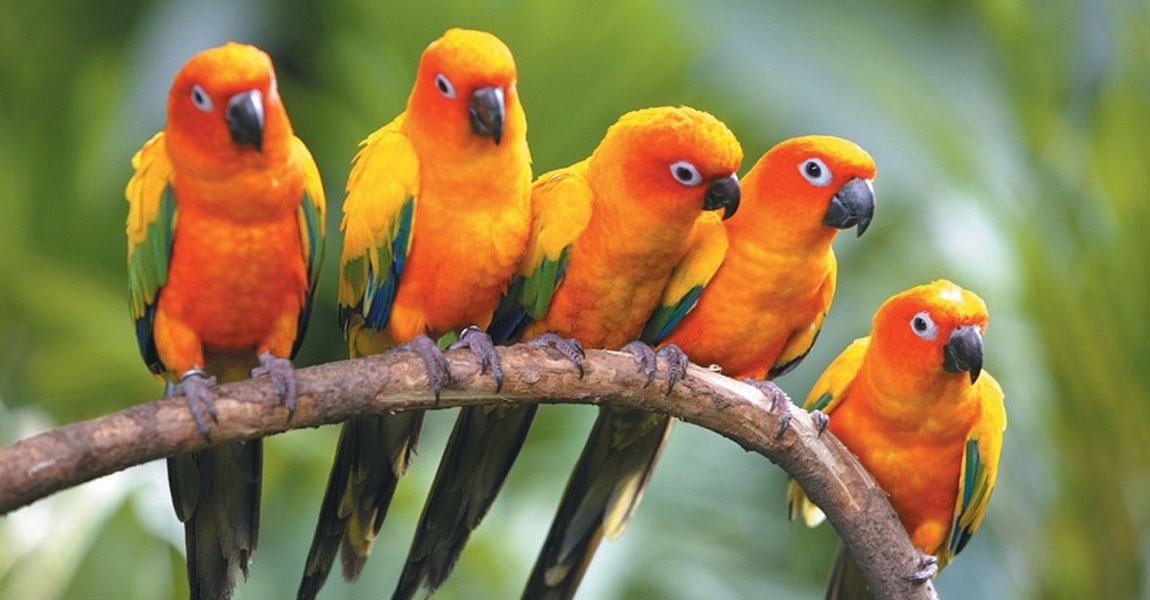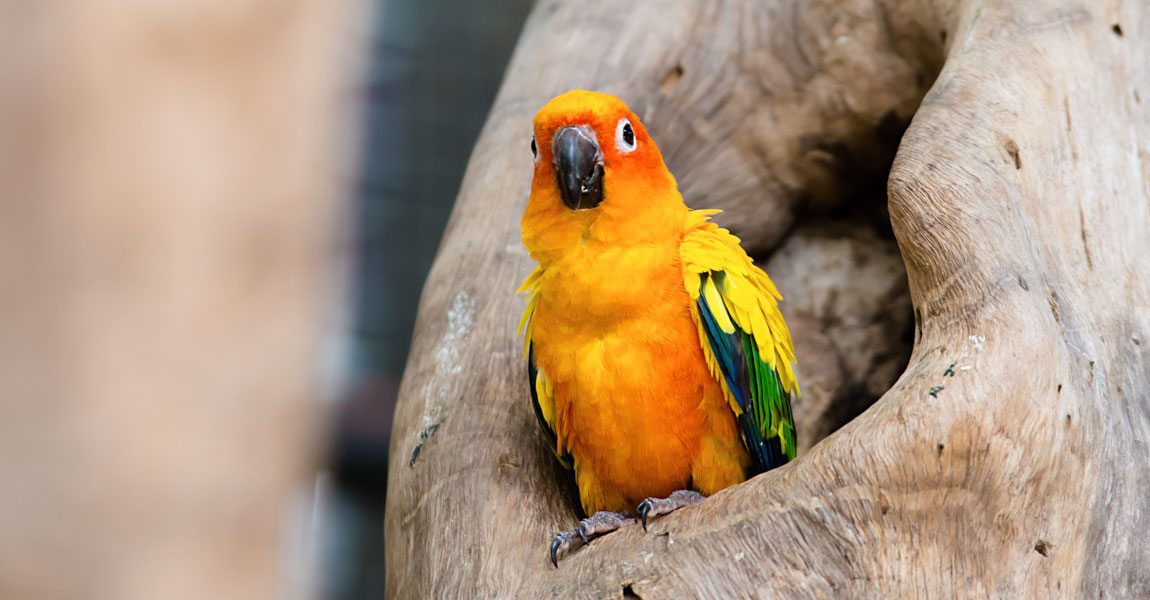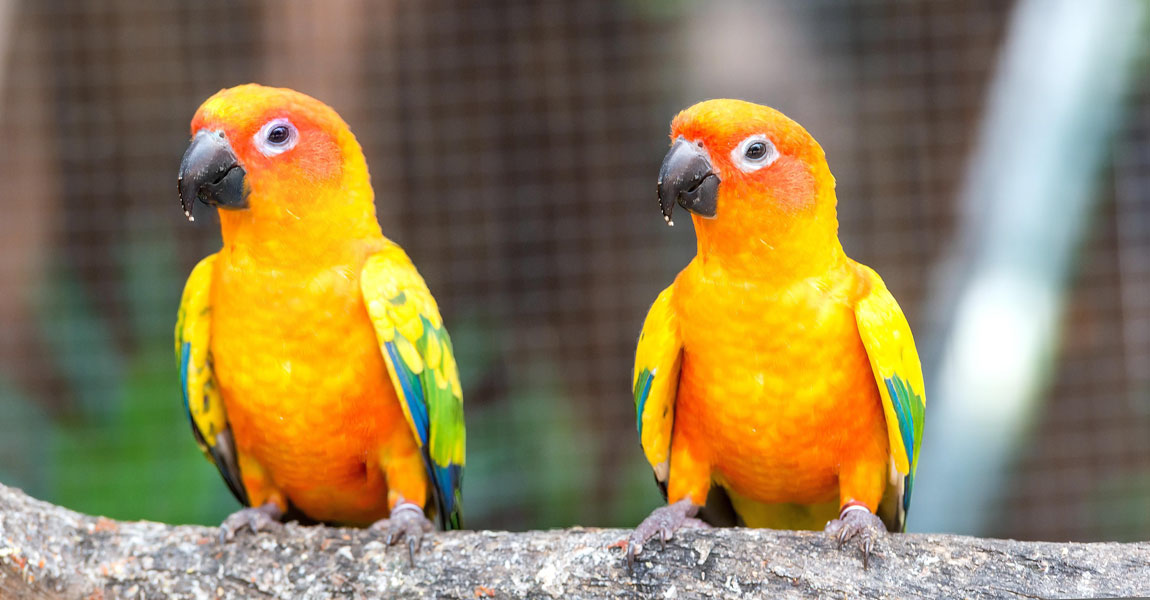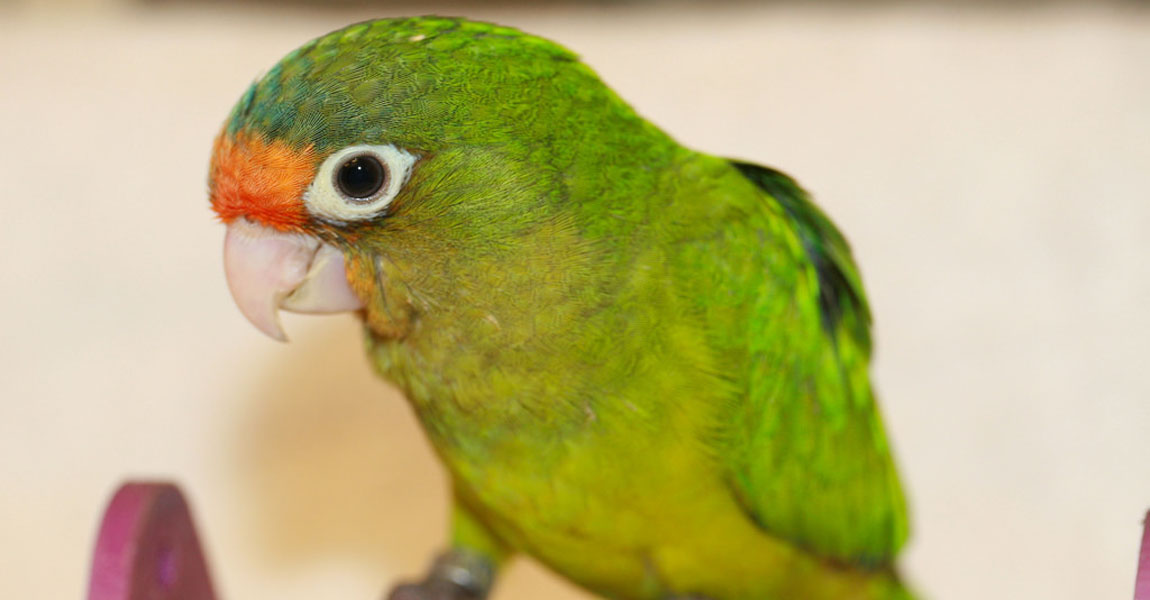Feeding Your Green Cheek Conure
Feeding your Green Cheek is something that should not be taken lightly. In fact, feeding your parrot a proper diet is essential for proper feathering, the bird’s emotional well-being, and the overall health. That being said, we’ve all heard the saying you are what you eat, right? Well, this holds true for your pet Green Cheek Conure too. If you feed your bird unhealthy foods such as chips, crackers, or fast foods your bird’s health will suffer. So, it is important to get the bird’s diet right to ensure your bird thrives in your household. Besides, these little guys are extremely colorful, and a proper diet will only make your bird’s feathers glisten as nature intended them to. Before we get into feeding your Conure, let’s look at their diet in the wild first.
In the wild, birds have access to literally hundreds of foods. Think of their environment like a never ending buffet. In the morning the birds will spend a great deal of their time foraging. Because their beaks are hooked, these parrots specialize in eating fruits. In the wild, fruits are not the only food preferred by these creatures as items such as blossoms, nectar, seeds, buds, and occasionally insects will be eaten too. For this reason, we should try to emulate the same diet in captivity. So what kinds of things should you feed your Green Cheek Conure in captivity? It’s simple! A healthy human diet will work.
Fruits and Vegetables
Fruits and vegetables should be a main staple for your bird. Offering an assortment of these food items will ensure your Conure remains healthy throughout its life. These items should be given daily, and should be served fresh due to the fact that spoiled fruits and vegetables will make your bird sick.So what kinds of fruits should be given to your parrot? The answer to this question is almost anything your fruit basket has to offer. They love ripe bananas, fresh Washington apples, sliced mangoes, papaya, Kiwis, peaches, nectarines, or figs. As you can see there are so many fruits to offer. Fruits are vital as the natural sugars help to feed a Green Cheek’s high metabolism and brain. Quite literally these birds are so active and they require large amounts of fresh fruit daily to keep their little bodies fueled.
Another thing that should be offered daily are vegetables. Vegetables are some of the most nutritious foods on the planet. Foods such as carrots, sweet potatoes, cantaloupe, sweet peppers, and butternut squash should be given every single day. Why? Because the vegetables mentioned are high in vitamins A. Vitamin A is an essential mineral that a lot of pet parrots are deficient in. These deficiencies can lead to ailments that eventually lead to death if not treated. For this reason, vitamin A should always be given on a regular basis through foods, not supplements.
Another important vegetable type that should be given regularly are dark leafy greens. Foods like kale, chard, basil, turnip greens, and spinach are just as important. These dark leafy greens have a great deal of antioxidants and are packed with vitamin A as well. Many Green Cheek Conures will nibble on the leaves throughout the day once the leaves are placed in a food bowl or on a kebab stick. These should be offered to your bird several times weekly.
There are so many vegetables that can be given to your bird. Believe it or not, some birds are picky eaters. For those that are picky, continue to introduce fruits and vegetables inside their cage. Over time, the birds will learn to eat these and enjoy them.
Again, fruits and vegetables should be a staple in your parrots diet, no exceptions! These birds need the complex carbohydrates to maintain and function properly. Not only do the carbohydrates give your bird’s the proper energy throughout the day, but also the fiber helps to move things along internally. Highly processed foods such as white bread, table sugar, or processed junk food may cause unhealthy bacteria to flourish in your birds intestines. Many birds who are fed junk diets may resort to plucking or showcase dull feathering.
Grains, Legumes, and Beans
Grains are just as important for your parrot. Like the fruits and vegetables, they too offer a great deal of fiber. These slow digesting carbs such as brown rice, quinoa, oats, or whole wheat toast are perfect breakfast items that can be given. Also, they don’t spoil as quickly too, which is another plus.Beans and legumes can be given as well. Try boiling some fresh brown rice with finely chopped spinach and adding some brown lentils or red lentils to the mix. Then watch how eagerly your bird devours the food. Beans and legumes are packed with protein and perfect for your Conure. This abundant protein source is perfect for feathering and muscle growth.
Thankfully beans and legumes are not too difficult to attain. They are cheap and can be found in any store. Though beans and legumes do come in cans, it is best you choose ones that are boiled without preservatives and are organic.
Meat / Protein for your Conure
Feeding your Green Cheek Conure small amounts of meat can be acceptable. But it should be said that this food item should be given sparingly. These protein items are not natural to them and they don’t go scavenging for carcasses when food is scarce. Rather, these birds may indulge in insects or grubs occasionally. For this reason, all protein items should be lean and should be given no more than 2 to 3 times per month. Too much animal protein is not healthy for your pet Conure. Other food items such as milk, cheese, ice cream, or yogurts should be given sparingly as well too.I know you might be thinking about the calcium in dairy; however, calcium is just as abundant in dark leafy greens and broccoli. That being said, milk should be avoided and you should know these parrots don’t have the proper enzymes to digest dairy products. Though some owners do give their birds small amounts of dairy, and truthfully most Green Cheek Conures don’t die from it, you’ll have to decide if it’s something you choose to give your bird. Again, you should know dairy is not natural to Green Cheek Conures. Also, dairy is filled with fat, hormones, and leads to cholesterol build up.
Natural and Healthy Fats
Natural and healthy fats are important for your parrot too in moderation. That being said, a majority of healthy fats should come from seeds and healthy oils. Seeds such as walnuts, pumpkin seeds, almonds, pecans, and even sunflower seeds should be given sparingly. Back in the old days, before proper parrot nutrition was known, many breeders only fed their birds an assortment of seeds. Though many birds did thrive on such a diet, many suffered as well. Quite frankly, a super fat diet is not healthy nor is a Green Cheek Conure designed to eat such a diet.Other fat sources such as coconut oil or red palm oil can be given too. These oils have fatty acids that promote glossy feathers. But remember there can be too much of a good thing! These fats can be drizzled over some of your birds dark leafy greens or mixed with a brown rice mixture. Some owners even toast fresh whole wheat bread with a little bit of coconut oil drizzled on top. A little goes a long way! These birds have tiny bodies and need roughly about a tablespoon every month, no more. The overall goal for a Green Cheek owner to strive for is a balance between these healthy fats, fruits, vegetables, grains, rice, and legumes. If you do, you’ll see your birds have radiant feathers if their diet is spot on.
Other oils that are hydrogenated or destroyed upon cooking also should be avoided. These oils include olive oil and vegetable oils. Olive oil can be given just as long as it is cold pressed and made of a higher quality.
Pellets and Commercial Diets
This might be a bit controversial section of the article, but it should be said pellets should really be given in MODERATION. Why? Firstly, many of the pelleted brands are simply companies looking to make money. Well then, you might be thinking what about the vets endorsing such products? We’ll unfortunately, many of them get compensated for their efforts to advertise pellets too. So, where is this going? The bottom line is that it all comes down to business and selling product. Some pellet blends change formulas due to shortages in ingredients or have poisoned birds due to spoiled batches. Some bird foods, which we’ll leave out, have been recalled due to many pet birds dying. Not only are pellets synthesized and processed foods, but many contain dyes or have been known to offer too many vitamins and minerals. So does that mean they are completely unhealthy? It depends how they are given.Pellets should be given in small doses throughout the week. There is no such thing as a one food brand for all parrots. Parrots have evolved to eat colorful foods that have many different textures and tastes. From a mental point of view, it’s simply not healthy. How would you like to only eat shredded wheat your whole life? See our point? To drive home this concept, you should know that some species of parrots have evolved to eat palm nuts, others grass seeds, nectar, some even eat the flesh from sheep! As you can see, each parrot species has its own nutritional needs. Besides, for more proof, look at what’s happening to people who eat tons of processed foods–it’s not good and the same applies to your Green Cheek Conure.
Pellets can be given; however, they need to be offered with the food mentioned above.




